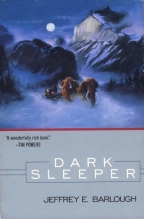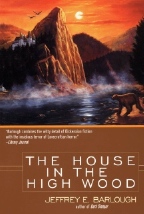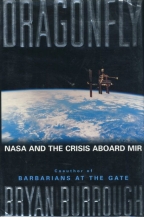 |
|
'Dark Sleeper' is a standout novel in the year it was published, and any other. Please buy it immediately so that you can enjoy the wonderful writing within. |
|
|
|
Jeffrey E. Barlough Maps His Own Genre
Incoming
The Agony Column for May 30, 2002
Commentary by Rick Kleffel
Some authors seem to blast on to the scene with the right mix of popularity, promotion and product to get themselves assured of publication for as long as they're producing anything that looks like a book. Alas, many authors fight like heck to get anything published, grab a contract with a major publisher, and then watch helplessly as their work disappears without trace. Reviewers such as myself try to rectify things when necessary, but there's not a lot we can do. It's up to the book-buying public to keep the good authors afloat. Today, I'm asking the book-buying public to hie thee hence to your local independent bookstore and order up both Jeffrey E. Barlough novels.
Barlough has released two novels that are so weird, so charming and so unusual that even to me they almost defy explication. Alternate history, science fantasy, gothic horror, every standard label except "Great writing" comes us short. It only takes a few pages for the reader to figure out that Barlough is both highly original and highly talented. But even after reading both novels, you might find yourself at wits end when asked to describe the books.
 |
|
'Dark Sleeper' is a standout novel in the year it was published, and any other. Please buy it immediately so that you can enjoy the wonderful writing within. |
'Dark Sleeper' was first published in 1998 by Western Lights Publishing. I can't find any copies of the hardcover edition -- if you have one, would you please write me? The Penguin/Putnam Ace edition was released in September of 2000, in a nice easily laid down trade paperback edition. Tim Powers provides the cover blurb and that should give the readers a clue who would like this novel. If there is any antecedent in the publishing world for Jeffrey E. Barlough, it is Tim Powers. Like Tim Powers, Barlough stitches together bits of history, the supernatural and science fiction to create a truly original piece of writing.
'Dark Sleeper' is set Salthead, a sort of 19th century version of San Francisco relocated to the Rocky Mountains. But not really. From page 1, we're not in the world we know. We're in Barlough's world. Salthead is a fog-enshrouded city on a lake in the 'Western Mountains'. Saber-toothed tigers haunt the hills; wooly mammoths draw wagon trains through the city's streets. Nineteenth century stylized-prose paints the picture.
Barlough's prose in 'Dark Sleeper' and 'The House in the High Wood' is one of the reasons to search out this fine writer. Barlough does something successfully that has sunk many writers. He writes in purposefully antiquated prose.
As much as readers want to enjoy the work of H. P. Lovecraft, and as responsible as he is for generations of horror and science fiction, his choice to write in dialects and purposefully antiquated prose detracts from the enjoyment of much of his work. The startling visions of his high fantasy, like 'The Dream Quest of Unknown Kadath' are buried beneath wordy recreations of the prose of actual Victorians. Likewise William Hope Hodgeson, whose incredible visionary work 'The Night Land' is truly marred by some truly bad faux-Victorian prose (and sentiment). Others have made better use of this style. Arthur Conan Doyle's work still reads quite nicely, but then he wasn't forcing the issue as were Lovecraft and Hodgeson. Charles Dickens can be a chore or a delight to read, depending both on the material and the reader's patience.
When I first started reading 'Dark Sleeper', the prose style required a brief period of acclimatization. It wasn't unpleasant; it was like a nice walk uphill into the forest, refreshing. It helped to divorce me from the real world, to engage me in Barlough's unique creation. From the get-go, you know that you're being told a story, and that the speaker is an old man. He's survived the events he's about to narrate, and he's not indifferent. "You'll forgive a mawkish, maundering old fool if he occasionally strays, ever so slightly, form the path of his story. Life is slower now and not nearly so endless. The clocks tick and I find myself listening to them."
Barlough never strays from his linguistic decision. He never veers, and he never takes it so far as to be impenetrable or annoying. Soon, it seems inconceivable that the novel could be written any other way. Soon after that, the style becomes so likable, you look forward to your next dip into the book as you might look forward to a conversation with a particularly voluble friend, a real raconteur who can spin a story like nobody's business.
And what a story Barlough has to spin. Something malign has arrived in this weird world of Salthead, something unsavory. One of the great pleasures of Barlough's books is his choice of character names. Titus Tiggs and Doctor Daniel Dampe are called upon by the citizens of Salthead to investigate and put a stop to whatever is causing ghosts of children to walk the streets and sunken ships to rise in the harbor of Salthead. The joy of discovering these characters is similar to the joy of the first time you meet Holmes and Watson. So is the prose, and it works perfectly, culminating in a journey worthy of Challenger.
 |
|
'The House in the High Wood' is the one of the best combinations of cheerful settings and dark intent ever published. It will delight you then chill you to the bone. |
To my mind, 'Dark Sleeper' was a standout publication for its year, but alas, the Philip K. Dick prize passed it by. Barlough's follow-up novel came in August of 2001 and from the title page we get: "Volume Two of the Western Lights Series", "The House in the High Wood" and:"A Story of Old Talbotshire". It's set in the same mountain range where 'Dark Sleeper' took place, but it's a different township -- Shilston Upcot in Old Talbotshire. Barlough keeps the same prose style but lightens up events so that it seems almost frothy. Don't worry - there's a dark heart beating ominously at the center of this deceptively delightful novel.
That's because Barlough does something very difficult in this novel, and he does it successfully. He creates a positive, beautiful village full of characters the reader will thrill to hear sitting about a table, discussing an uneventful day. Writers of horror fiction can usually do an effective job at creating a dark character or an unpleasant place. But it's much hard to turn the picture upside-down. Writing about beauty, the pleasant things of life is perhaps the most difficult task a writer can take on. In 'Once...', James Herbert stumbles badly when he tries to do so. Clive Barker actually succeeded against all odds in 'Imagica'.
In 'The House in the High Wood' we're dealing with a scenario similar to that of 'Dark Sleeper' -- something unpleasant seems to have lodged in the titular dwelling above the village of Shilston Upcot and it's up to the Squire, Mark Trench and his visiting friend, Oliver Langley, to find out what, who and why. Every visit with every character in this novel is a joy. The village is lovingly created whole cloth from your favorite snips of Dickens and Doyle, effortlessly re-mixed in Barlough's beautiful prose.
But what Barlough has in store for his characters is not so pretty. He manages to write a novel that is as dark as it is light, though it's entirely free of the kind of violence that we usually associate with 'dark' writing. Barlough has a very Lovecraftian fate in store for his wonderful characters, and the readers will literally gasp at the scope of what he accomplishes in 'The House in the High Wood'.
A call to his publishers turned up no new release planned for this year, alas, and efforts to locate the author on the web have led to no result. For readers, the lesson is clear -- you have to look, find and vote with your wallet. There's hope yet that Barlough may release another novel, and until he does, we have two fine examples of actually weird fiction. You'd be well advised to buy them while they're still readily available.
 |
 |
|
I finally found this book available in a mass market paperback edition from some vendor in Canada. I'd be running searches for it for months, turning up nothing. |
The newest PS Publishing novella is by Steve Erikson, which certainly factored in my decision to find his other works. |
A glimpse into my Inbox reveals some potentially interesting reading. I've finally managed to find some copy of all three of Steve Erikson's novels, all subtitled 'A Tale of the Malazan Book of the Fallen'. It hasn't been easy, especially since we're talking about a fantasy series that has been favorably compared to George R. R. Martin's 'Songs of Ice and Fire' books. Given the huge quantity of what one wag on the net called 'extruded fantasy', it seems that you should be able to call up your local independent and say 'Set aside a trilogy for me!' Alas, that's not the case. But, by hook and by crook, and by actually searching repeatedly, and coming up with no results, eventually results were yielded. Now I've got 'Gardens of the Moon' (729 pages in a mass market paperback edition) 'Deadhouse Gates' (684 pages in a trade paperback proof) and 'Memories of Ice' (898 pages in a trade paperback original copy). How the hell am I supposed to find the time to read those? Fortunately, the PS Publishing novella by the same author titled 'Blood Follows' (and probably the impetus for me to find and buy the others).
 |
 |
|
An original novel from Golden Gryphon, the publishers of so many great collections certainly made its way onto my radar screen. |
Dan Simmons' latest collection inspired me to dig this unread non-fcition book out of my shelves. There's a story in Simmons' book about Mir. |
Also in the stack is 'The Wild Boy' by Warren Rochelle, a novel from Golden Gryphon, and the publishers of so many excellent short story collections. And finally, the latest Dan Simmons collection I read, 'Worlds Enough and Time', has inspired me to dig out a non-fiction work from a couple of years ago title 'Dragonfly', by Bryan Burrough. Subtitled 'NASA and the Crisis Aboard Mir', it looks to be fairly gripping, but simply slipped out of my ken. Who knows if it will or won't again? I've got to admit that my reading schedule is fairly easily interruptible.
Thanks,
Rick Kleffel